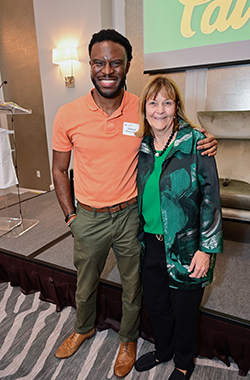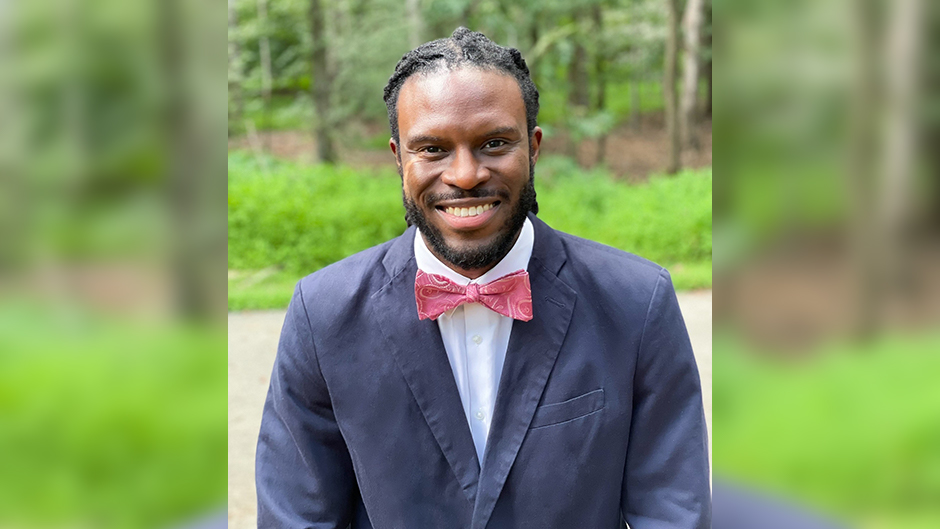“I was a shy kid growing up, like really timid, but going to the University of Miami challenged me to grow and develop into the man I am today,” Christel Wekon-Kemeni, B.S. ’15, reflects.
Now a first-year pediatric nephrology fellow, Wekon-Kemeni’s acceptance into the University of Miami with a full scholarship through the Ronald A. Hammond Scholar program served as his first eye-opening experience that he could accomplish anything he set his mind to.
“Never in a million years did I think that I could get a scholarship of that magnitude to attend my dream school, but I believed in myself, and it really set the trajectory for the rest of my life,” he said. “I thought: if I can do this, just imagine what else I could do.”
In addition to his pre-med course load studying microbiology and immunology, with minors in chemistry and psychology, he routinely volunteered with the Multicultural Student Affairs office and was an active member of the Iota Chi Chapter of Kappa Alpha Psi Fraternity, Inc., the United Black Students Organization, the Minority Association for Pre-Health Students, and the Brothers Overcoming Negativity and Destruction, to name a few of his affiliations.
“I was the second oldest in a pretty big family, which meant growing up I was always helping my parents by babysitting or giving my time to my six siblings, so it organically became a part of my nature to help others,” he said. “In college, I had more free time and space to be creative with how I helped others, so I became very involved in service on campus.”

Throughout the course of his undergraduate years, Wekon-Kemeni would be recognized with several awards for his service, including the Unsung Hero Award (2012), the Excellence in Leadership Award (2013, 2014), and national recognition with the Who’s Who Among Students in American Universities and Colleges (2015).
“That people see me as a leader really means the world to me because I was always just doing whatever I could to reach my goals and to help others reach their goals along the way,” he said.
Wekon-Kemeni would meet his future wife at a service event.
“I was a junior, and she was a freshman,” he recounted. “We had a number of mutual friends, so we had seen each other from afar, but we hadn’t officially interacted with one another until we both volunteered at an elementary school event. A few weeks later, I saw her in front of Stanford and decided to shoot my shot by asking her to the movies.”
“It was not the best first date. I mean, it was fine, but we didn’t think we’d go out again. The next night, we ended up in the same group of friends going out in Miami, and we had a really good time. Since that impromptu second date, we’ve been together ten years and married in 2021.”
By his senior year, his hard work earned him the attention of the Iron Arrow Society—the highest honor attainable at the University of Miami—which recognizes exceptional scholarship, leadership, character, love of alma mater, and humility semi-annually among a hand-selected group of students and faculty.
When he first heard the rhythmic beating of the drums getting closer—the telltale start of the Iron Arrow initiation ceremony—he had no idea they were for him.
“I remember hearing the drums slowly getting louder and louder, and I thought to myself, ‘Oh, that’s cool, someone must be getting tapped,’ and I returned to my meeting with a person who, looking back, was also a member of the Iron Arrow Society,” Wekon-Kemeni recalled. “But it had never even crossed my mind that I would be worthy of being tapped into Iron Arrow until they rushed in, scooped me up, and marched me to the mound.”
“The entire time, I was just in bewilderment and shock. It’s something I had seen happening to other people throughout college, but I never really thought that it would happen to me. It was definitely one of the greatest days of my life because it really validated that I was making the right choices in college, that I did everything I could to help others, and that people saw what I was doing and viewed it as worthy enough for such an honor.”
After graduation, Wekon-Kemeni pursued his dream of becoming a doctor at the Wake Forest University School of Medicine.
The summer before medical school, Wekon-Kemeni struggled to find relatable accounts of what to expect or online communities for minorities in health care.
“Ultimately, I just decided to make the type of resource I was looking for, which was a positive description of what medical school can be like,” he said. “I had no prior experience blogging. I just started putting my thoughts to paper—or to WordPress, I guess. After I made my first post, I almost quit. A month later, I decided to come back to it, and it slowly grew into something bigger than a blog; it became a platform to help and serve others.”
Wekon-Kemeni used his website, BlackMan, M.D., to document his experience as a Black physician, share helpful resources, and offer inspiration by showing the different trajectories of minority health care leaders.
He even created a crowdfunded scholarship, raising thousands of dollars for high school students who dream of becoming physicians.
“Creating the scholarship was such a full circle moment,” he said. “I promised myself early on that as soon as I could, I would give back to help others financially, but I just didn’t realize I would be able to get to that point so soon. I’m so pumped to be able to realize that goal I set for myself as a teenager. Every time I hear updates from winners of the scholarship, I tear up knowing that through the goodwill of others, we were able to help these young kids to pursue their dreams.”
Currently, Wekon-Kemeni is in the first year of his fellowship at Emory University, working in pediatric nephrology at the Egleston Children’s Hospital in Atlanta.
He says caring for children affected by kidney disease is an honor. “It’s really amazing to see how resilient kids are, so watching them transform back into their normal, authentic self feels almost magical.”
To current University of Miami students, Wekon-Kemeni offered: “If you believe in yourself and your dreams, you can achieve anything you set your mind to. There’s no limit to what you can do. But I also encourage you to try to use your gifts and skills in a way that can not only impact your life, but positively impact other people’s lives, too.”

